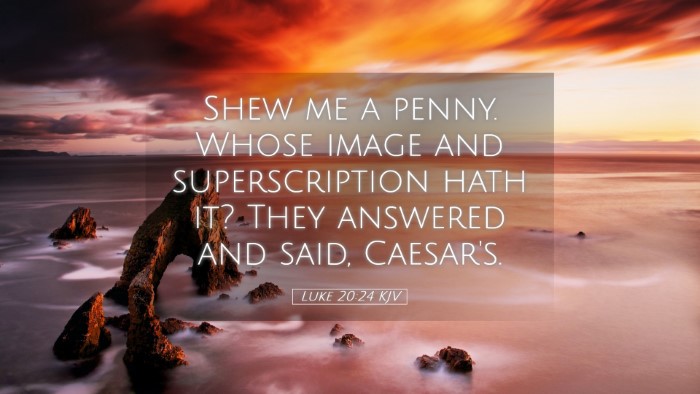Commentary on Luke 20:24
Luke 20:24 presents a significant teaching of Jesus concerning the relationship between the material and the spiritual realms. This verse states: "Show me a denarius. Whose likeness and inscription does it have?" They said, "Caesar's." This interaction occurs within a broader context of questioning aimed at trapping Jesus in His words, providing rich material for theological reflection.
Contextual Analysis
This passage takes place during Jesus' last week before His crucifixion, a time marked by increasing hostility from religious leaders. They seek to undermine His authority and discredit Him publicly. The question presented to Jesus was intended to force Him into a politically damning response regarding taxation and His allegiance to Rome.
The Request for the Denarius
-
Significance of the Coin: The denarius was a Roman coin, indicating the political context of Jewish life under Roman occupation. By asking for a coin, Jesus illustrates the intersection of faith and secular authority.
-
Symbolism: The denarius bore the image of Caesar, symbolizing the claim of the Roman Empire over the Jewish populace. This brings forth the idea of ownership and authority, both from a religious and civic perspective.
The Question of Likeness
Jesus’ question, "Whose likeness and inscription does it have?", is profound. By directing their attention to the image on the coin, He invites a reflection on identity, authority, and the nature of belonging. In the Judeo-Christian tradition, likeness often pertains to being made in the image of God (Genesis 1:26), creating a striking contrast between the divine and the temporal.
Theological Implications
This passage offers extensive theological implications for understanding Christian duty and the relationship between church and state:
-
Render Unto Caesar: The conclusion of this interaction is significant; Jesus instructs to "render to Caesar the things that are Caesar's, and to God the things that are God's" (Luke 20:25). This dual responsibility highlights the separation of religious and civil domains.
-
Christian Responsibility: Believers are called to be good citizens and fulfill civic duties, including taxation, while simultaneously prioritizing their commitment to God. This duality is crucial for understanding the believer’s role in society.
Insights from Commentators
Various public domain commentators provide profound insights into this text:
Matthew Henry
Henry emphasizes that Jesus' response illustrates His wisdom and His ability to avoid traps set by His adversaries. He notes that while the coin belongs to Caesar, humanity belongs to God, a reminder that earthly authority is temporary, while God’s sovereignty is eternal.
Albert Barnes
Barnes expounds on the implications of possessing the image of Caesar; any authority that a ruler holds is derived from God. He highlights that acknowledgment of civil authority should not detract from devotion to God. Barnes further clarifies that Jesus’ teachings instruct believers on how to navigate complex social and spiritual obligations.
Adam Clarke
Clarke notes the cultural context in which this dialogue occurs, reflecting on the Jewish understanding of ownership and loyalty. He points out that the use of Roman currency was a necessary compromise, but it does not nullify the ultimate loyalty one owes to God. Clarke calls attention to the importance of recognizing God’s authority in all aspects of life.
Conclusion
In summary, Luke 20:24 invites both scholars and practitioners to explore the intrinsic complexities of faith within the secular world. Jesus’ interaction serves as a timeless reminder of the balance required in fulfilling both earthly and heavenly responsibilities. As pastors, theologians, and students of the Scripture reflect on this passage, they are called to consider how these principles apply in contemporary contexts, ensuring that while believers engage in societal obligations, they remain devoted ultimately to God's authority and kingdom.


